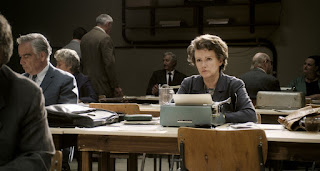Semper Fi: The Long Journey Home
Originally published in February 2015.
AFTER WATCHING BAND OF BROTHERS (2001) AND THE PACIFIC (2010)
Although I never served in the military, I feel there is at least an ounce of understanding from necessary projects such as Band of Brothers and the Pacific. While I am grateful and hope I never feel what it is like to be in a muddy foxhole or hold the wooden grip of a military rifle, smell the sea's salty foam or the gunpowder from hot bullets during battle, I cannot help but pause in appreciative awe at what it must have been like and continues to be like for those who have.
I cannot claim to understand war, but from my study of film and reading of primary accounts, I feel safe in my estimate that the greatest casualty of war is the loss of one's humanity. We get caught up in measuring the greatness and valor of a warrior by particular sacrifices, usually physical in nature, ranked by decorative medals and special honors, but it seems the value of a soldier is in their endurance of their long odyssey from humanity, their descent into oblivion, and if we who are stateside are lucky, to witness and hear their long journey home.
Unfortunately, the cost of war is measured not only in blood and treasure, but in the civilian's lack of understanding the true nature of sacrifice. We get caught up in the politics, the self-righteous attempts of justifying self-centered points of view, and fail to comprehend the virtue of obedience demonstrated by servicemen and women, that in this obedience is not the blind following of patriotism but the determination of character, honor, courage and fraternity. Semper fidelis is more than a cheesy, emotive chant. It is the higher calling of a life worth living, that many hear but few comprehend.
War is more than hunting down an enemy to satisfy a masculine obsession of superiority. It is sometimes the unfortunate but necessary failure of humanity that can emblazon future fires of peace. And while the victor writes the narrative while those defeated must withstand the shame of being conquered, it is important for civilian and enlisted not to perpetuate the oblivion of battle, not preserve the greatest casualty of war, by likening hatred with war, for then even the victor has lost and thus mankind as a whole.


~Michael DeNobile
AFTER WATCHING BAND OF BROTHERS (2001) AND THE PACIFIC (2010)
Although I never served in the military, I feel there is at least an ounce of understanding from necessary projects such as Band of Brothers and the Pacific. While I am grateful and hope I never feel what it is like to be in a muddy foxhole or hold the wooden grip of a military rifle, smell the sea's salty foam or the gunpowder from hot bullets during battle, I cannot help but pause in appreciative awe at what it must have been like and continues to be like for those who have.
Unfortunately, the cost of war is measured not only in blood and treasure, but in the civilian's lack of understanding the true nature of sacrifice. We get caught up in the politics, the self-righteous attempts of justifying self-centered points of view, and fail to comprehend the virtue of obedience demonstrated by servicemen and women, that in this obedience is not the blind following of patriotism but the determination of character, honor, courage and fraternity. Semper fidelis is more than a cheesy, emotive chant. It is the higher calling of a life worth living, that many hear but few comprehend.
War is more than hunting down an enemy to satisfy a masculine obsession of superiority. It is sometimes the unfortunate but necessary failure of humanity that can emblazon future fires of peace. And while the victor writes the narrative while those defeated must withstand the shame of being conquered, it is important for civilian and enlisted not to perpetuate the oblivion of battle, not preserve the greatest casualty of war, by likening hatred with war, for then even the victor has lost and thus mankind as a whole.


~Michael DeNobile


Comments
Post a Comment